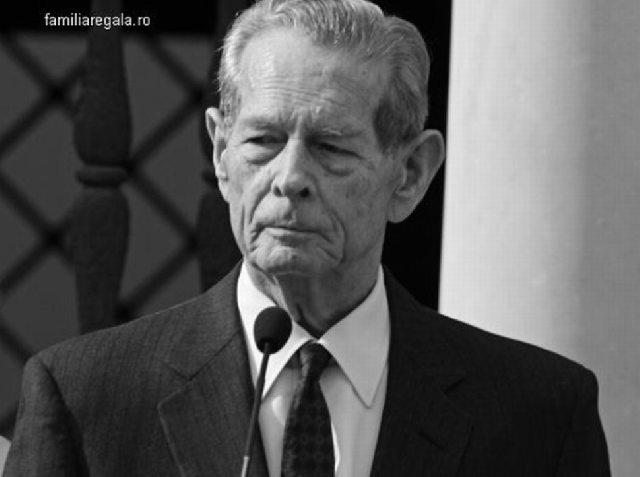100 years since the birth of King Michael I of Romania
One of the centennials celebrated this year was that of the birth of King Michel I

România Internațional, 08.11.2021, 14:00
The year 2021 has been marked by more centennials than usual. One of them is the celebration of the birth of Romania’s last sovereign, King Michael I. He was a king with a difficult task, of leading the country in times of distress, during the Fascist regime, the second world war and the coming to power of the Communist regime.
Michael I was born on October 25th, 1921, at Peles Castle in Sinaia, the Romanian monarchs’ residence. His parents were king Carol II and princess Helen of Greece and Denmark. He had the blood of the largest dynasties of Europe, Hohenzollern and Romanov, but King Michael I would always say: I am Romanian ,by birth and destiny. He was named Michael in memory of Michael the Brave, prince of Wallachia in the 17th century, the one who attempted, on his own, to unite Wallachia, Moldavia and Transylvania.
Mihai first became king at the age of 6, in 1927, after the death of his grandfather, Ferdinand I. His father, the future king Carol II, had given up the right of heir to the throne a year before. In 1930, after three years of regency, his father accepted to become heir apparent and be crowned king of Romania. Michael got the honorary title of Great voivode of Alba Iulia, as any heir apparent would. His second rule started 10 years later, in 1040, after his father renounced for the second time the sovereign’s prerogatives.
Thus, in September 1940, Michael got to the throne of Romania for the second time, but this time at a very delicate moment, with the country affected by massive territorial losses and the ascent of the far right. General Ion Antonescu became the head of the state, and the relation with him was a dark chapter in the sovereign’s memories, as he recalled it back in 2008, in an interview to the Centre of Oral History of the Romanian Radio Broadcasting Corporation.
To him I was something he would ignore, just somebody who would sign things, the head of the army, somebody dressed up in a uniform who was heading parades, that’s all. He would show more respect to my mother, and thanks to him actually she came back after September 1940 and for that I was grateful. But then, trouble started. In one of our New Year’s messages, I think, at Christmas, in 1943, I said some negative things about the war. The Germans got angry too, but there were no consequences.
King Mihai I was reproached for the way Ion Antonescu was treated after his arrest on August 23rd, 1944, when Romania joined the allied forces: the king refused to pardon the former head of state. For that change of sides Romania was repaid with the return of North Transylvania, which it had lost in August 1940. In 2008, the king explained what had happened then:
Many thought that I could pardon him or change his sentence. They don’t know how the constitutional system worked back then. No act, not even one signed by me, was valid unless co-signed by a minister. And that was valid for any kind of decree. Back then the justice minister was Patrascanu, and he refused to sign. That’s what people did not understand. In that case, the Russians and the Anglo-Americans would have never accepted it.
After the war, the Communist Party got the grip on the entire state with support from the occupying Red Army. King Michael I and his entourage opposed the Soviet roller coaster with all the means they had. But the lack of support from the democratic West made all the difference. On December 30th, 1947, with all the state institutions under the control of the Communist regime, king Michael I was forced to abdicate and to leave the country together with his mother. At 26 he was about to start a new life and a family, based on Christian values.
During all those years of communist dictatorship, the king’s voice could be heard on the free radio stations condemning the crimes and abuses committed by the Communist regime. After 1989, the exiled king returned to the country and the Romanians started learning about a piece of history that had been stolen from them. In the 2008 interview he also gave some simple advice for the future generations:
Just behave humanely and don’t despise anybody. Be kind, in general, but not show infinite kindness, because sometimes one needs to turn the screw, as they say. I’ve seen so many terrible things happening to people in the country and when I see that the authorities don’t care and despise them, that makes me sick. I was taught differently: that one should treat all people in the same way, be they poor or otherwise, we are all human beings.
King Michael I’s centennial coincided with the day of the Romanian Army which, on October 25, 1944, liberated the entire territory of Romania from under the foreign occupation. (MI)






























